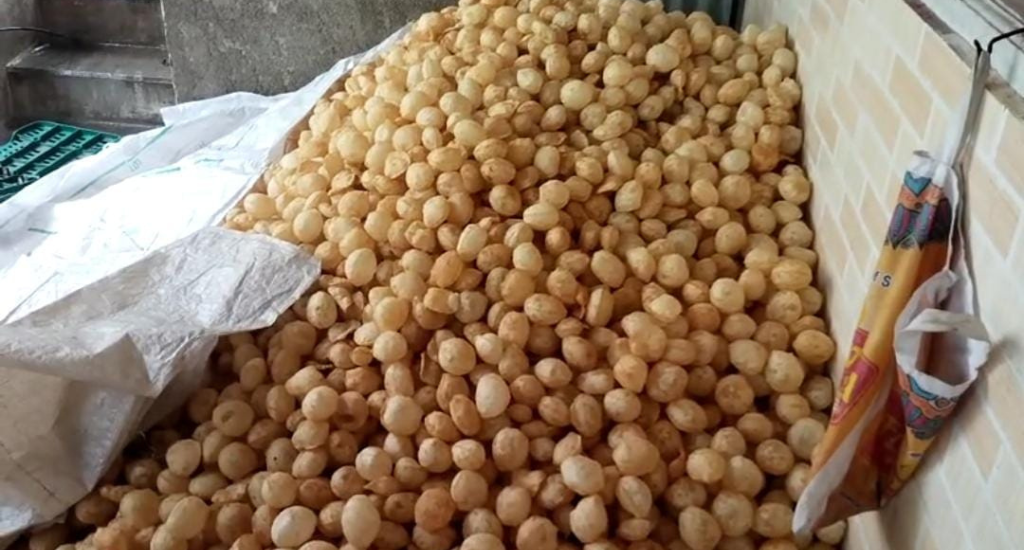
Caution: Reading this will make you crave paani-puri
With no background in making puris for the delectable pani puri or in running a business, a group of women in rural Tamil Nadu become successful micro-entrepreneurs.

With no background in making puris for the delectable pani puri or in running a business, a group of women in rural Tamil Nadu become successful micro-entrepreneurs.
Next time your taste buds dance to the crisp symphony of full-blown paani puri, delivering an electrifying burst of flavours, pause for a moment and thank individuals like Rukumani – unseen women who shape your gastronomic delight.
Rukumani is a shy, single woman of 46, who defies norms associated with business women. Hailing from Chikkardanhalli, a quaint hamlet in Palakode taluk in Dharmapuri – one of Tamil Nadu’s underdeveloped districts – she is a member of the Bharati Pushparagam Self-help Group.
Palakode’s economic engine is a state-run cooperative sugar mill. By default, large and medium sugarcane cultivators dominate the rural economy. Farmers with small and micro holdings take on farm jobs and rely on backyard poultry and livestock rearing.
Rukumani from a small land holding family is part of a group of 12 women united by common challenges. Trapped in the grip of poverty, and bound by societal taboos and minimal education, these middle-aged women took a conscious decision to break free and put their inner strength to effective use.
Watch: Odisha women earn lakhs by cooking patua from veggie peels

Rukumani and her peers are the ones who make those delectably crunchy, perfectly rounded puris. Their puris grace the shelves of wholesale and retail shops, eventually finding their way to roadside paani puri vendors and kiosks in bustling shopping malls across Tamil Nadu.
“Their journey began five years ago when the block resource centre (BRC) of the Tamil Nadu Rural Livelihood Mission (TNRLM) at Palakode identified women who had been left out of the self-help group network,” said Sivalingam, BRC manager, Palakode.
The first step towards their economic betterment began with the women forming a self-help group (SHG), saving money as a group, and eventually taking loans. But they were keen on doing something that would bring income.
“None of us was sure about what to do,” said Selvi, wife of a livestock farmer and wage worker. “We were not given any training, unlike other SHGs.”
Their challenge was not just making additional income but breaking barriers.
Also Read: Rural entrepreneur empowers other women in UP
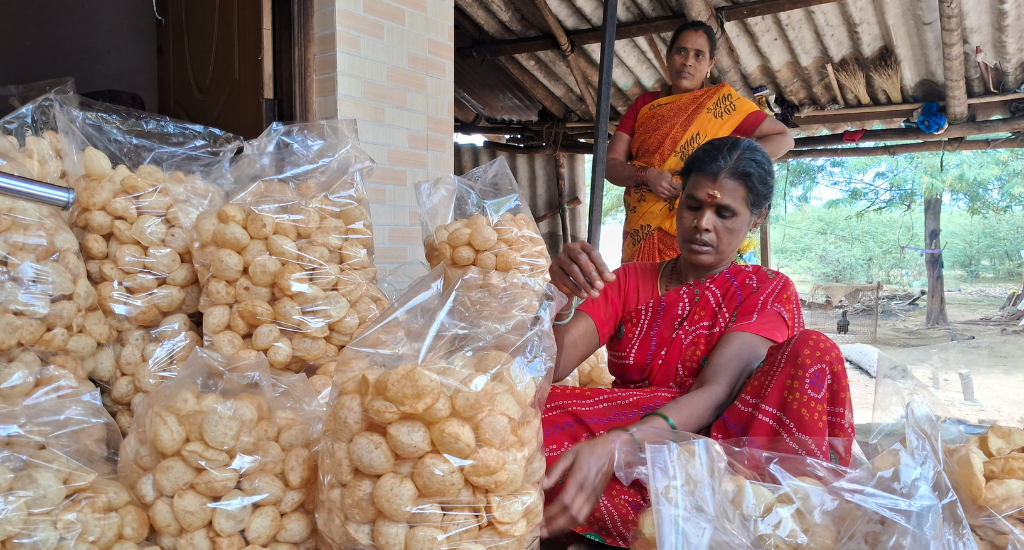
“Our family members were sceptical but finally gave in to our idea of a group venture,” said Bharathi, a member.
“We toyed with the idea of making (pani) puri and selling them to shops. Without giving much thought, we took the plunge. We had to learn many things,” said Rukumani.
The women received a loan of Rs 50,000 from Mahalir Thittam, a socio economic empowerment programme for women, implemented by Tamil Nadu Corporation for Development of Women Ltd.
“As the group had a clean audit record, we approved their micro-enterprise idea and got them the loan,” informed Kumudha, the coordinator of TNRLM BRC, Palakode.
With minimal cooking utensils, the women started making small puris in the house of Rukumani’s younger brother who gave them space to begin their business.
The initial enthusiasm was challenged by several unforeseen hurdles. The women had no clue of how to source inexpensive, good-quality ingredients at a lower price. The result was poor quality puris and high wastage.
Also Read: A rural woman’s ‘toy story’ towards success
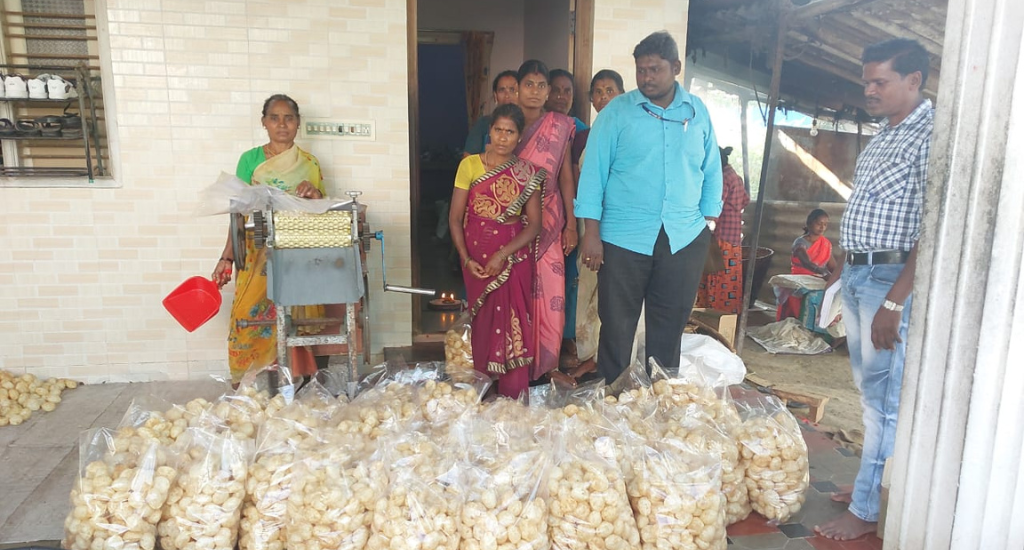
“The initial production was a meagre 20 packets, each weighing 90 grams, every day. Wastage was high, as only 20 percent was converted into saleable puris. We hardly made a margin of Rs 2 per packet,” said Palaniamma (55), a widowed daily wage worker who also took care of livestock.
While struggling with the production, the women tried to streamline the packaging and marketing. The husband of one of the women stepped in to help. He procured the raw material and took the packaged puris to wholesalers and retailers in the neighbouring towns and also in Dharmapuri, the district’s headquarters.
Thanks to the high labour migration from north Indian states deep into the villages, towns, and cities of Tamil Nadu, their favourite snack paani puri, eventually caught up as a popular street food among the Tamils as well. The women sensed a sustained demand.
Despite their hard work, the women were hardly making any money. They felt that the only way to make a turn-around towards profitability was to scale up production – for which they needed more working capital. So they approached the TNRLM officials who were monitoring their work closely.
Also Read: Rural BPO centers in Bihar open new doors for girls
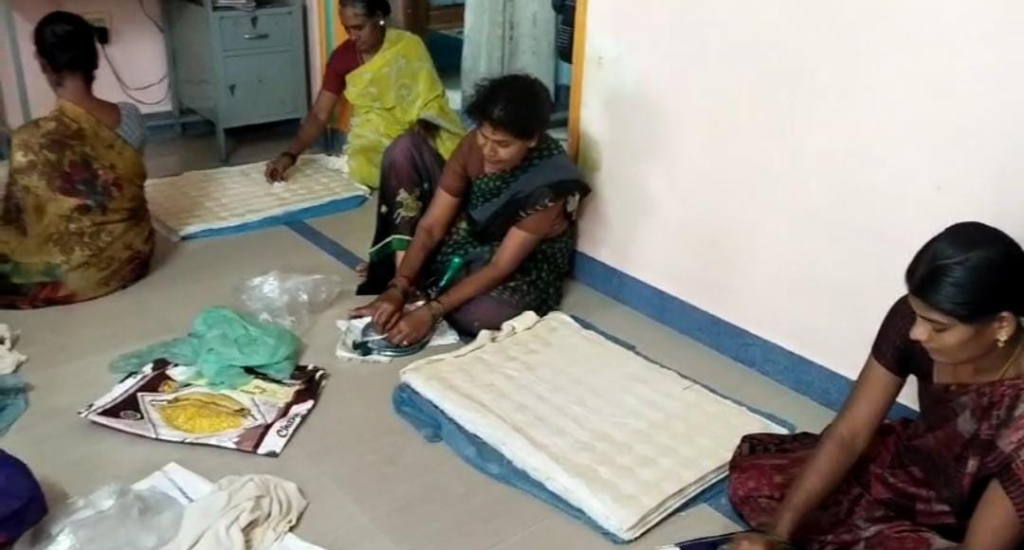
“We helped the women draw a project plan for Rs 4 lakhs and helped them get a bank loan under the Mudra scheme,” said Sivialingam.
Now the women have a stove large enough to hold two big woks and a mechanical device to slice the dough into smaller lumps, among others.
The women divide the labour among themselves. On average, they use 90 kg of flour and produce 100 to 120 packets per day, each weighing 90 grams – as against 20 packets from the same quantity of flour earlier. While the cost of production is about Rs 90 they sell each packet for Rs 100–110.
“The quality and cost have been stabilised by buying the right quality flour in bulk,” said Sampath, who helps the women in procuring the ingredients and in marketing.
Each member takes her daily wage of Rs 300. The group saves Rs 1,000 a day.
Also Read: Enterprising women: Stories of inspiring micro-entrepreneurs in Maharashtra
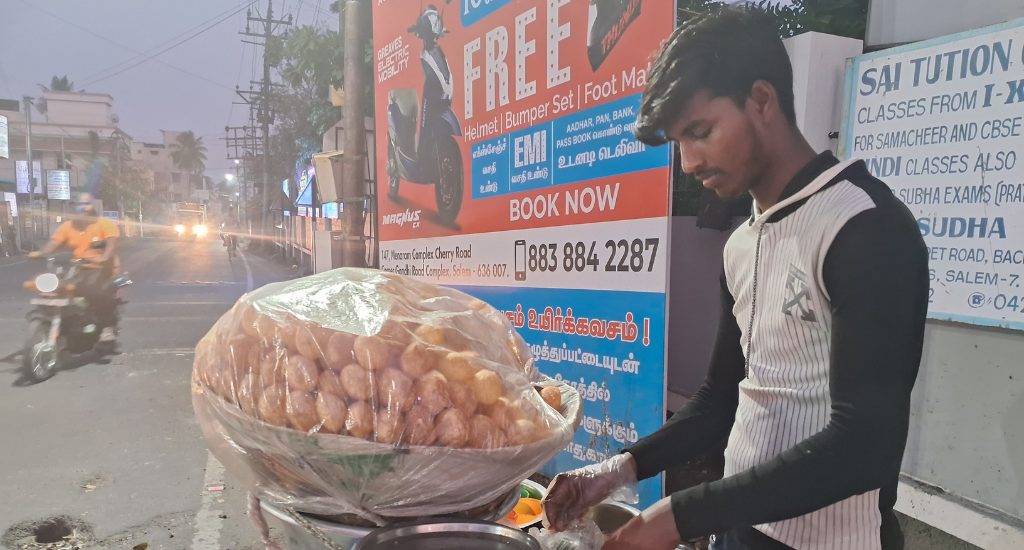
“They keep this money in the account of Bharathi Pushparagam SHG and borrow for their household needs and pay it back promptly,” said Sivalingam.
The women agree. Rukumani borrowed money for her mother-in-law’s medical expenses, and Kala and Selvi for their children’s education – making their families understand the importance of their group venture.
With the prompt repayment of the Mudra loan and the total surplus of Rs 2 lakh, the women have gained the image of a disciplined and determined group. The women have also had inner growth and are now confident of overcoming challenges.
“We’re confident that we can manage the entire operation even if there are no men to help us,” asserted Rukumani and Palaniammal.
They want to carry on, eager to write the next chapter of their empowerment story.
Also Read: Assam woman pickles her way to success
The lead image shows the puri, one of the ingredients of popular snack paani puri, made by rural women in Tamil Nadu (Photo by Muniraj)
George Rajasekaran is a journalist based at Salem, Tamil Nadu.